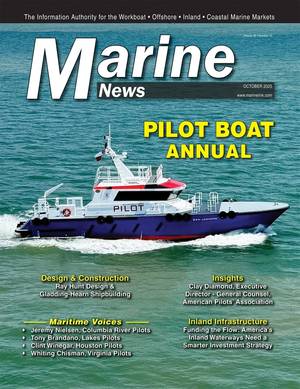A Maritime Lesson to be Learned from Aviation
The aviation industry learned a hard lesson earlier this year regarding regulatory compliance. While the lessons learned from the incident are many, the common theme that should be taken away by the maritime industry is that an owner and/or operator is responsible for compliance regardless of what individual regulatory personnel may say, accept, or even put in writing.
For maritime companies without a compliance program, it has become common practice to rely primarily upon the opinions of individual Coast Guard inspectors or commands regarding regulatory compliance issues, despite occasionally receiving inconsistent guidance. What is wrong with this strategy? In the future another inspector may enforce a regulation which wasn't previously enforced. This enforcement may be associated with a significant fine, or worse, a requirement to cease operation resulting in significant loss of revenue. Coast Guard personnel may also mistakenly impose requirements on a vessel that are not actually required, resulting in a costly compliance error. Since most maritime industry personnel are aware of the right to appeal in these instances, we will focus on the more interesting problems associated with a situation in which a Coast Guard official makes a decision, error or omission, which results in a favorable outcome to the vessel operator.
Years ago when I was breaking in as a Coast Guard marine inspector, a qualified inspector was showing me around an older vessel which was getting a certificate of inspection (COI) for the first time. As I looked up all the regulations he was telling me about, I happened across a section which said that all doors leading from a passenger compartment must be a minimum of 32 inches wide. I measured the door to the passenger compartment and found it to be 28 inches wide. I pulled the qualified inspector aside and pointed it out to him. After some consideration, he said he wasn't going to worry about it. He was a good inspector and had been on and off of that boat for about three months at the time. He didn't want to have to tell the owner at that late stage that the door had to be cut out due to a regulation that he had overlooked. But was the inspector really doing the owner a favor? Wouldn't the owner rather cut out the door then, when the boat was in the yard, than have to do it next year when another inspector notices the door while the boat is in operation? What if the boat rolled over and passengers drowned inside? Would it be an adequate defense for the owner that the Coast Guard inspector didn't say anything about the doorway?
Some vessel operators seem willing to accept a determination by any Coast Guard member who is making a decision in their favor. In fact some industry members call around to find a Coast Guard person who will give them the answer they are looking for and will "hang their hat" on that decision. This is often followed by the question, "Can I get that in writing?" The truth is this is a risky way to do business. There is a formal process for requesting waivers from regulations. However, individual inspectors in the field have little leeway regarding the enforcement of regulations. An individual inspector may tell you that he is not worried about an item, or he may totally overlook an item that is noncompliant, or he may even tell you that you don't have to do something when the regulations say you do. This does not mean you have been granted a waiver from the regulations, or that you are in compliance. In actuality, it only means that particular regulation will not be enforced by that individual inspector, during that particular inspection cycle.
Some interesting parallels can be drawn between the Coast Guard enforcement scenarios I have described above and the recent Federal Aviation Administration (FAA)/Southwest Airlines case. A review of the details provides an interesting lesson to be learned in the maritime industry.
In March of 2008, Southwest Airlines was awarded a $10.2m fine for failure to comply with FAA regulations. During published interviews following the announcement of the fine, Southwest Airlines CEO Gary Kelly was quoted as saying:
"Our interpretation of the guidance that we got from the FAA at the time was that we were in compliance with all laws and regulations."
In April of 1988, a portion of the fuselage of a 737 jet aircraft tore off in flight with 90 passengers on board. Following the investigation, the FAA issued a directive for all operators of 737s to conduct inspections for similar cracks which were found to be causative factors during the accident investigation. Southwest Airlines operates many 737s and was complying with the directive with FAA oversight. However, Southwest requested approval from an FAA inspector and his supervisor to continue to fly some aircrafts which should have been taken out of service in accordance with the FAA directive. A technical report was provided by Southwest to explain the reasoning and the minimal risk. The FAA supervisor allowed Southwest to continue to fly the aircrafts. Other FAA inspectors disagreed, and senior FAA officials eventually became aware of the situation. The FAA issued Southwest a $10.2m fine for failure to comply. Southwest argued in their own defense that they were told to inspect the aircrafts, and they inspected the aircrafts; they were told to find cracks, and they found cracks; they were told to disclose the findings, and they disclosed the finding; and that it was the FAA that told them they could continue to fly. It was that last assumption that was incorrect and why they received a $10.2m fine. It is also the one that the maritime industry should take note of. The FAA maintained that they didn't tell Southwest to continue to fly, but that it was an FAA inspector and his supervisor, neither of which had the authority to supersede an agency directive.
You can "hang your hat" on verbal OK's from well-intentioned Coast Guard inspectors, but it is a risky business. So what is the prudent operator to do?
• If you know a Coast Guard individual is allowing something that is not allowed in the regulations, or in the written guidance, request a waiver rather than take a verbal OK. This ensures that the decision will be scrutinized by more than one officer in the chain of command. This is best for the industry and for the Coast Guard in the long run.
• Strive to be in compliance with the regulations, and written guidance and policy directives.
• If you know an inexperienced Coast Guard inspector is mistaken, don't take advantage of the situation. Help him become a better inspector. It will be better for everyone in the long run. After all, you may be dealing with a future Captain of the Port.
Kevin Gilheany is a maritime industry consultant and a retired Coast Guard marine inspector. His company is Maritime Compliance International, LLC, www.maritimecomplianceinternational.com. He can be reached at 504-319-3229, or Email: [email protected].












